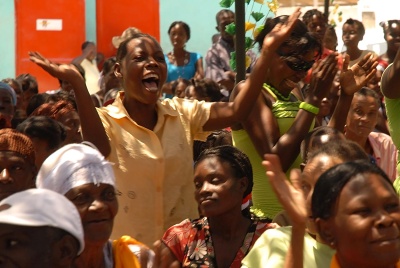 |
| Photo: ATD Fourth World |
I was recently invited by the ATD Fourth World team in Haiti to spend a week with them to know more about the work they are doing and get to know the active members of ATD Fourth World in the country. I had not traveled to Haiti before. Yet it is a country that we cannot help having images and visions of in our minds given the media exposure it receives – due to political unrest and since 2010 due to the devastating earthquake.
My flight to Port-au-Prince was through Miami. Talking to people at the long immigration and security queues, many of them had been to Haiti as US Armed Forces personnel. “Watch out for the mosquitoes,” was the most common advice shared.
What I was not prepared for was the sight that met me at the departure gate: groups of teenage Americans, dressed in their shorts and branded sneakers, iPhones and tablets in hand and speakers on ears. Along with accompanying adults, they were off to Haiti during the summer break as part of their church group. I sat next to one of the adults on the plane, who was part of a church running an orphanage. Another I spoke to was part of a San Franciscan church group building a school with a local pastor in the Haitian countryside. For their month in the country, they were bringing all their food provisions with them.
There has been a lot of debate over the influx of foreign aid organisations and churches coming to Haiti since the earthquake. Much of that is very critical, due to its short-termism and it being driven by outside agendas rather than in partnership with local people. Another effect is its influence on the need for Haitians to speak English to find work. It was revealing that a number of the young Haitians who are involved in projects with ATD Fourth World speak English. One works with a US church group, others see learning English as a vital skill in order to find work with such groups who require interpreters. Of course, there is a lot of positive to be gained from learning another language: it is rather the hegemony of the English language that raises a number of questions.
Leaving Haiti after a fascinating week which enabled me to begin learning about Haiti and about the work ATD Fourth World is doing there, the plane was once again full of young Americans heading home. Unfortunately I didn’t manage to speak to any of them. It is a concern what they bring to such a complex situation in the country given their very young age and short amount of time they spend there. On the other hand, it would be interesting to know what drives them to give up their comfort for a month or so and go to a place they know very little about.
In ATD Fourth World we speak a lot of mobilising young people’ passion for a fairer world by offering them a space in which they can develop a commitment alongside people living in extreme poverty. What will become of the commitment of these youngsters who head to Haiti every summer in 5 or 10 years time? Or the thousands of young Brits who head off on “gap-years”? Can their commitment to people they know little about also be channeled into mobilising for a fairer society in their own neighbourhoods, schools, places of work? It is our task, in all our countries, to continue to mobilise young people’s enthusiasm and energy for positive change, by giving them the chance to act towards long-term change against extreme poverty.





